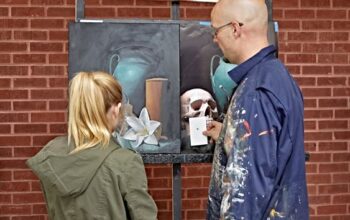TOREY BURBRINK
JC WORLEY
By Sherri Coner
Before age 30, Torey Burbrink became a drug addict, lost all contact with her family and childhood friends, became homeless and served a lengthy prison sentence on drug-related charges.
“I used to think, ‘Who’s gonna want me when I’ve been through so much in my life?’” Burbrink said.
Little did she know her future life partner was arrested in the same 2018 drug bust in Johnson County.
“He got arrested the day of the bust,” Burbrink said of JC Worley. “But I went on the run.”
Worley received a 10-year sentence.
After police caught up with Burbrink, she was sentenced to eight years.
Today, Burbrink and Worley are clean and sober, deeply in love and living together with plans to marry. Both are grateful for their sober lives.
“Judge Nugent sent me to prison and saved my life,” Worley said of the Honorable Paul D. Nugent of Johnson County’s Reentry Court which operates out of Superior Court 2.
Burbrink immediately agrees that because of Nugent, her life is healthy and happy now.
After serving five years of their sentences, they were offered an early release with a commitment to participate in the reentry program, one of 11 reentry courts in the state. Burbrink and Worley both chose that option.
Like most who participate, they left the Department of Corrections after serving time for drug-related crimes.
“It’s intense,” Burbrink said of the reentry program. “You go to court every week, do two or three drug screens a week and attend three NA or AA meetings a week.”
Though Worley’s father had been a police officer before later becoming a pastor, Worley had been on the wrong side of the law for several years. He never expected to actually form friendships with officers.
That attitude completely changed after he got involved in the reentry program.
“I’m friends with some policemen,” Worley said. “It’s amazing.”
In June, five years of sobriety for each of them was cruelly tested when the couple’s premature son, Aero, died.
“People from the reentry program came to our son’s funeral,” Burbrink said.
“They showed up for us,” Worley added. “They’re amazing people and they really care.”

Not that many years ago, neither of them would have been emotionally strong enough to even live through the level of grief and pain they suffered when their baby died. They would have immediately medicated the pain through drug use.
Thanks to what they have now, such as a network of round-the-clock support, an education about coping skills and relapse triggers and a sincere relationship with their high power, Burbrink and Worley continue to navigate through their grieving process without experiencing relapse.
“If you’re ready for recovery, once you know you’re really done, you can find help and all the tools you need,” Worley said.
With every new day, life is more positive and a lot more rewarding.
One of the most painful places in Worley’s early days in recovery was when he started building back a relationship with his oldest children who are now 29, 24 and 14.
“For 10 years of their life, I wasn’t there,” he said. “Part of the pain is about building back the relationships I lost with them. But the other part is about somehow forgiving myself for hurting them so much.”
When the mother of Worley’s children from another relationship recently relapsed, he was awarded full custody of all three children, a 9-year-old and 5-year-old twins.
“Unfortunately, their mother is now incarcerated,” Worley said.
Since leaving prison, he not only has custody of his younger children, Worley is also laying carpet again, a skill he perfected years ago.
Worley is also back to music and never leaves a gig without sharing an important message.
“Every show that I do, I mention that I’m in recovery,” he said. “Out of our darkness, we just want to always share some light.”
Burbrink now works as a certified recovery advisor, visiting addicts in their homes. She discusses stress management and tells clients where they can find the same support in the community that she and Worley found.
“It’s the most rewarding work,” said Burbrink, who also plans to mentor incarcerated women.
Because they both follow and give full attention to working the 12 steps of recovery, the relationship they share is by far the most healthy one either of them has ever experienced, Burbrink said.
“We both feel equally about this,” Worley said. “The 12 steps helps you learn how to be a better person and make amends when you need to. The 12 steps is also about giving back.”
For the first Franklin Recovery Fair last year, Burbrink shared her story with all who attended.
This year, Worley will share his own story at this event, scheduled for Sept. 16.
“Getting arrested in Johnson County and having Judge Nugent is what saved my life,” Worley said. “It was God’s work.”


